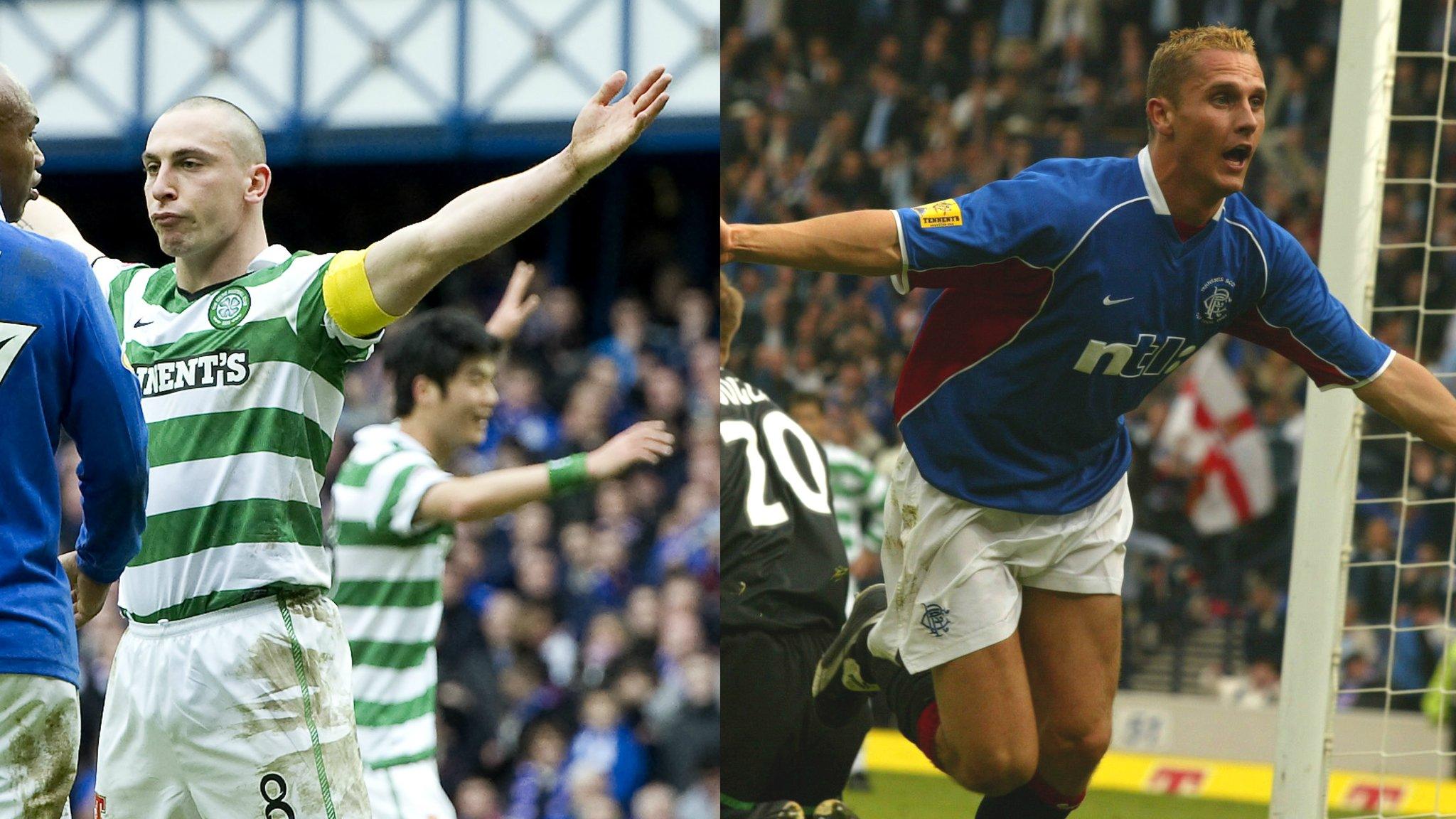How will Rangers' return to Premiership affect Scottish football?
- Published
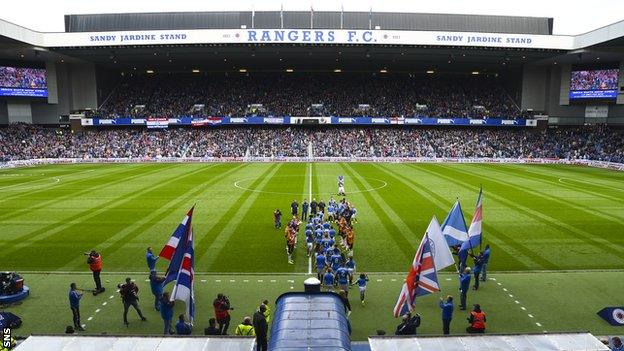
The Alloa players formed a guard of honour in April for Championship winners Rangers
Rangers' return to the Scottish Premiership after a four-year absence has increased the sense of anticipation ahead of the new campaign.
The restoration of the Old Firm rivalry with Celtic over the course of a whole season, rather than one-off cup games, has the potential to provide an additional competitive dynamic to the title race.
But how has Rangers' absence from the top flight affected Scottish football as a whole since 2012?
And what will be the likely impact of their return - in a sporting, financial and cultural context?
Will they be universally welcomed back? Will the traditional narrative of Scottish football be swiftly restored, or a completely new chapter written?
How will it affect the Premiership as a whole?
The overall average attendance figures for the top-flight dropped during Rangers' absence, with the Ibrox side's large travelling fan base filling away grounds in the lower leagues instead.
The average attendance fell from 13,861 in 2011-12 to 8,806 in 2014-15, before rising again last season to 9,764.
That trend was mirrored by some clubs, with Celtic's average home attendance dropping from 50,904 in 2011-12 to 44,849 last season. Yet other clubs saw their average home attendance rise, most notably Aberdeen, with 9,296 in 2011-12 to 13,094 last season.
Hearts and Hibernian also saw their average attendances rise, with the Tynecastle club maintaining that with regular full houses in the Championship and in their return to the top-flight last season.
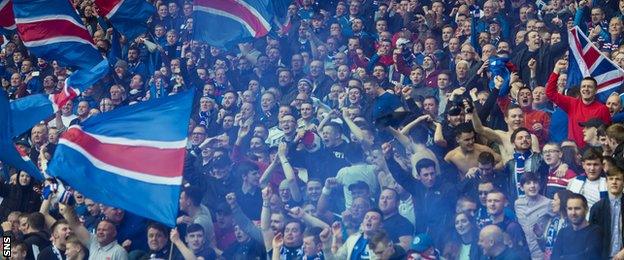
Will fellow Premiership clubs welcome back Rangers' large away support?
So overall attendances are likely to climb again with Rangers returning to the top-flight, not least because individual rivalries have been put on hold - Rangers last played Aberdeen in January 2012.
In terms of Rangers' home support, season ticket sales have increased from 37,339 last season to 41,931 this term.
"It will be good for the players and the fans to have those big games back," said Aberdeen captain Ryan Jack.
"I've seen it over the years, it's always been big games at Ibrox and Pittodrie when Rangers and Aberdeen met. It will be no different this year and something that we're looking forward to.
"You can see that Rangers coming back into the league is going to make it more challenging. We know it's going to be a big task, but the belief in the squad is there and there's no reason why we can't challenge."
Additionally, the average goals per game in the top-flight has broadly risen over the last four years, compared to the four that preceded it.
Average goals per game in Scottish top flight - last eight seasons | |
|---|---|
Pre-Rangers' absence: | In Rangers' absence: |
2008-09 - 2.40 | 2012-13 - 2.73 |
2009-10 - 2.57 | 2013-14 - 2.75 |
2010-11 - 2.56 | 2014-15 - 2.51 |
2011-12 - 2.64 | 2015-16 - 2.81 |
What difference will it make to Celtic?
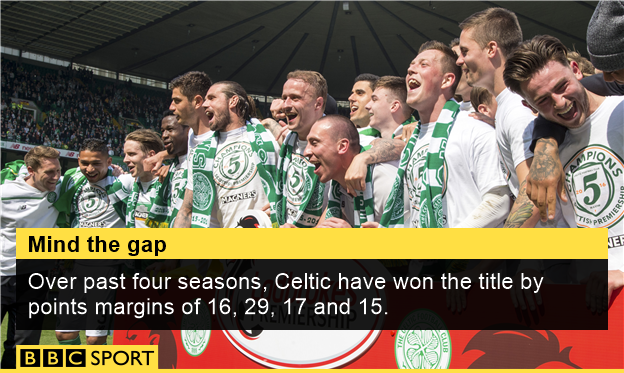
Celtic have remained the dominant side in Scotland's top league, despite an improving challenge by Aberdeen. In the four seasons that the Ibrox side have been absent from the top-flight, Celtic have won the title by 16, 29, 17 and 15 points respectively.
Aberdeen and Hearts will contend that they will continue to press Celtic at the top of the league, and Rangers' intention is to add to that dynamic. Season ticket sales at Celtic have risen this summer, in part because of the arrival of Rodgers but also the return of the Old Firm fixture and rivalry.
Asked at his Friday media conference if the return of Rangers makes it a more attractive league, Celtic manager Brendan Rodgers replied: "I don't see it as that.
"I came to Scottish football because of Glasgow Celtic, one of the great clubs of the world.
"Celtic-Aberdeen has its own history as well, Celtic-Hearts; they all have their own meaning.
"But of course the Celtic-Rangers derby is a big game."
How will it affect other clubs in the Premiership?
The immediate impact is clear, since clubs can expect home games to be sold out or close to sold out when Rangers are visiting.
There was some disquiet when the fixtures were released, though, with Partick Thistle, Motherwell and Hamilton all calculating that they will lose out on around £150,000 in revenue since they are playing Celtic and Rangers once each at home, and twice away before the split, while other clubs will host both Old Firm teams twice.
Rangers are also expected, given the relative strength of their Championship-winning squad and a budget that outstrips all but Celtic in the Premiership, to be challenging at the top end of the table.
That will make it more difficult for middle-ranking clubs to secure a top-six finish.
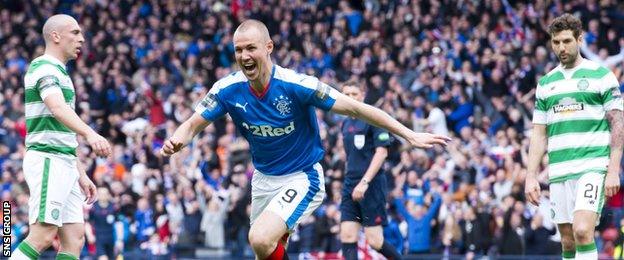
Kenny Miller celebrates scoring the opening goal against Celtic in their Scottish Cup semi-final last season
In general, though, players, as well as league and club officials, welcome the return of a high-profile club back to the top-flight.
Hamilton chairman Les Gray, whose team travel to Ibrox on Saturday in the Premiership opener, said: "Largely speaking, Rangers bring full houses to everywhere they go and they will bring something to the league.
"From our point of view, having Rangers back adds to the excitement. It makes it more difficult for clubs like us to stay in the league but that is part and parcel of the league.
"We've got to beat the teams round about us and anything else is a bonus."
Ross County and Rangers have never played in the same league at the same time and the Staggies' chairman Roy MacGregor is relishing taking his team to the south-west of Glasgow.
He told BBC Scotland: "Ibrox is the only ground that Ross County haven't been to, so that will be a nice experience in September when we go there for the first time.
"I think it's refreshing to have them back there. We were just in the league when they were put out of the league and dropped to the Third Division so we didn't really have a view on what was happening at that stage.
"I think Scottish football has generally missed them and I think on that journey back from the Third Division to the Premier League I've been particularly encapsulated by their fan base.
"I think the fans got a really raw deal by their directors in what happened and I think they were very loyal. They went to all the grounds around Scotland.
"They did it the right way and they worked themselves back up through the league and I'm delighted for the fan base that they got their team back in the top half.
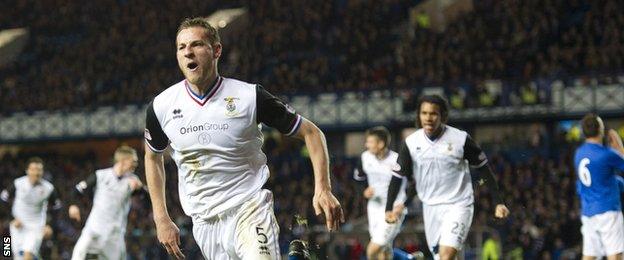
Gary Warren celebrates scoring for Inverness CT in a 3-0 League Cup win over Rangers in 2012
"I think the league will be stronger for it. I think the financial value of the league will be stronger with Rangers back and we need to be in Scottish football wanting our better clubs to be better."
St Johnstone boss Tommy Wright reckons Rangers have a stronger squad than last season and believes they "could mount a challenge" for the title.
For Dundee captain James McPake "it's another stronger team in the league, but we're hoping to be stronger as well".
"It's a challenge, but a positive challenge," he said.
Inverness Caledonian Thistle captain Gary Warren stated: "When Rangers come into the league, it's always one of the first fixtures you look at as a player.
"You look forward to these games, you look forward to going to Ibrox and testing yourself against the top players.
"It will be good for the league itself, hopefully it puts Scotland a bit more on the map again in terms of the Celtic v Rangers derby. It's the strongest the league's been, and they're one of the main reasons."
What will it do for global interest in Scottish football?
The Scottish Professional Football League have filled their major sponsorship contracts and have a long-running deal in place with broadcasters, so there won't be an immediate uplift in commercial revenue.
Even so, the return of Rangers brings additional profile and opportunity for the league itself, with renegotiations likely to result in an increase in income.
"If you go back to the period before Rangers left the division, there's a chance of an imminent return to those values," said Alan Ferguson, a sports marketing consultant.
"But most of the major sponsorship decisions that affect Scottish football are made outside the country, usually inside the M25 or M4 corridor and they have viewed Scottish football as having been on pause for the past four years.
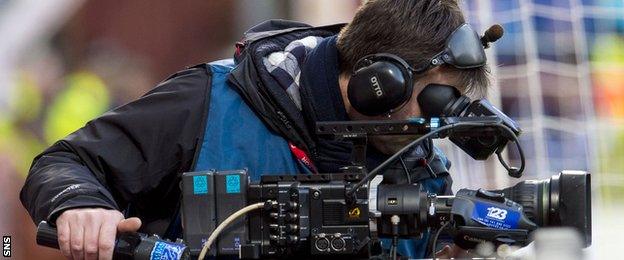
Existing broadcast deals mean there will be no immediate increase in TV revenue for the SPFL clubs
"They now regard that it's good to go again, that Scottish football is complete with the return of Rangers, so they'll look at it differently.
"The league have sold their inventory. They have a very lucrative deal with Ladbrokes, they've re-launched the League Cup and the Challenge Cup with another sponsor. So in the shorter term they would argue that they've sold up, but over the next couple of years the revenues should rise because there is this feeling that Scottish football is back up to full speed.
"It's a mini-Souness moment, because Brendan Rodgers coming to Celtic, Joey Barton coming to Ibrox, speaks volumes for the interest that lies in Scottish football. The broadcasters, who are the main funders of the game, will be delighted because they get back four matches a year that they all fight for, namely Celtic v Rangers.
"I know some people in this country don't refer to the Old Firm, but everybody down south is and they're the games that capture the interest nationally, gives the broadcasters a return on their money, fills the pubs and the clubs who pay big money to have [live] sport."
The return of the Old Firm fixture does bring additional pressures on the likes of Police Scotland and the NHS, as well as further scrutiny of fan behaviour, with the Offensive Behaviour at Football Act currently being challenged by Labour MSP James Kelly.
"The Old Firm fixture has always lent itself to a cocktail of pantomime and poison and you cannot deny its, sadly often negative, impact on wider society," said David Scott of the anti-sectarian charity Nil By Mouth.
"Its return presents us with both a challenge and an opportunity. The challenge is one of history and the problems which have surrounded the game in the past, but the opportunity is there for the fans, clubs and governing bodies to show that we want to make progress and that the vast majority of us can leave the hate behind. "
- Published17 April 2016
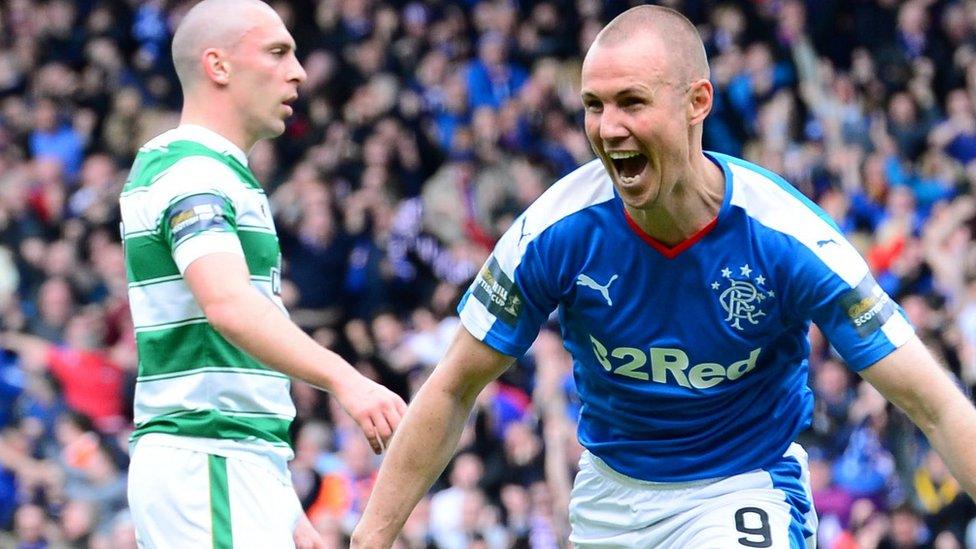
- Published13 April 2016
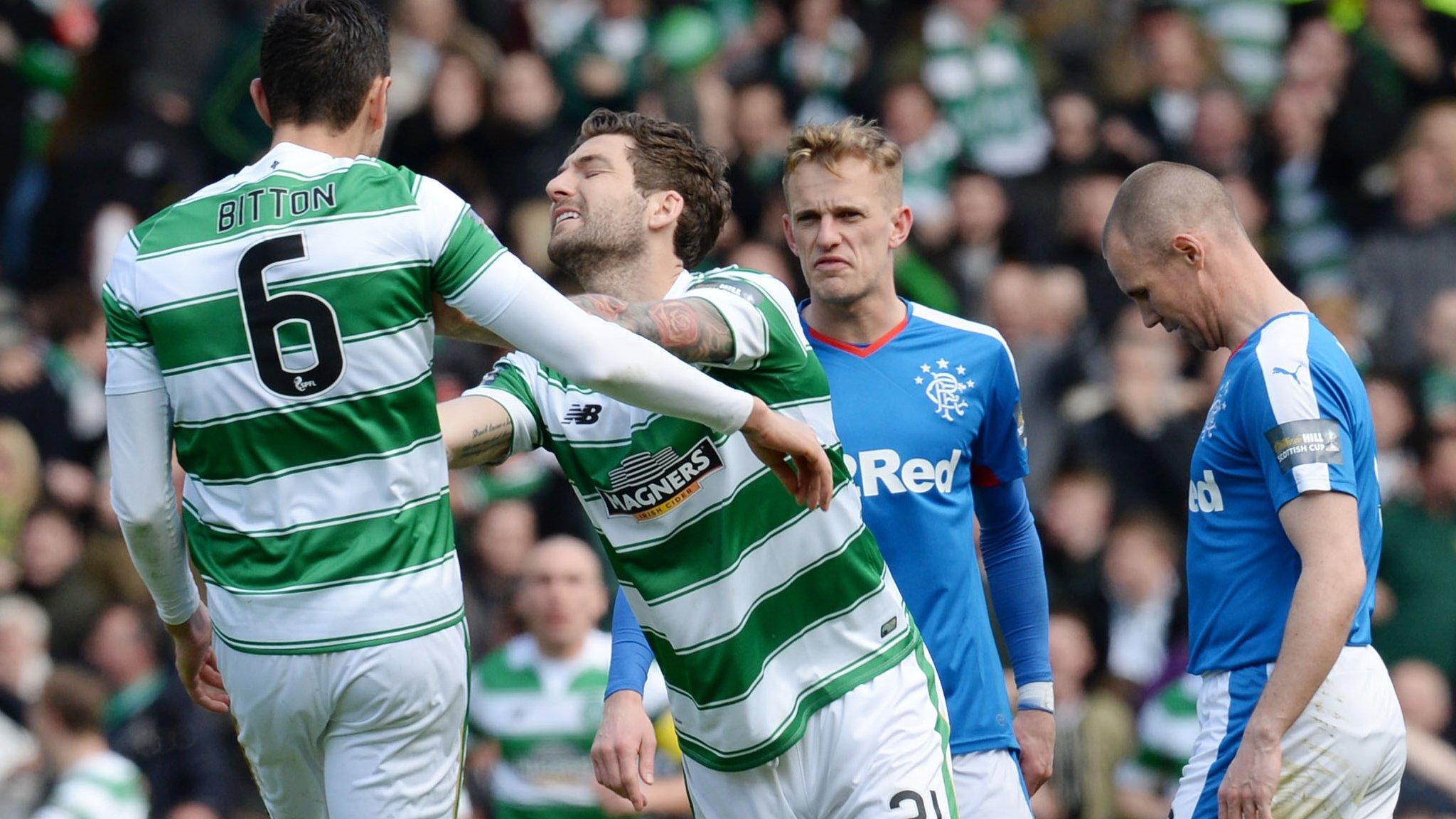
- Published14 April 2016
